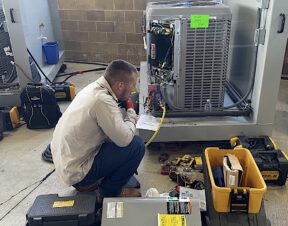 By late January, at least 24 states had declared an energy emergency, according to NBC News. The propane shortage and accompanying price hike were felt around the country, but the Midwest got hit harder than other places. A crucial supply pipeline that closed last fall, combined with the wicked winter, lead to prices nearing $5/gallon delivered.
By late January, at least 24 states had declared an energy emergency, according to NBC News. The propane shortage and accompanying price hike were felt around the country, but the Midwest got hit harder than other places. A crucial supply pipeline that closed last fall, combined with the wicked winter, lead to prices nearing $5/gallon delivered.
Wisconsin Gov. Scott Walker even allotted $8.5 million to help ease the pain in his state. The money went to a program to help families buy fuel. Then he earmarked another $8M in temporary lines of credit for propane distributors to make sure they were able to fill their own storage tanks. Walker did this because he – or someone on his staff – knows that LP is a unique fuel. Because of the way the liquid propane is produced, distributed and utilized, it’s often less available than fuel oil or natural gas.
How can it be that the safety of millions of Americans and their property is in jeopardy because of a fuel shortage? Why is this even an issue? The limited LP infrastructure makes its availability spottier than other energy sources.
Seasonal and limited
Natural gas is produced at thousands of wells across the country. Through an expansive structure of hubs, pipelines and utility networks, it’s delivered underground to both homes and commercial facilities for space heating. But more importantly, it’s also used for industrial processes and electric power generation. The infrastructure that supports natural gas is massive and almost entirely underground.
While fuel oil isn’t domestically produced in the volume that natural gas sees today, it’s still more widely distributed than LP, with much steadier year-round use. Light to heavy road vehicles, agriculture machinery, trains and of course heating equipment all draw from a very well established oil distribution network.
Backyard barbeques aside, liquid propane is used almost exclusively as a heating fuel, and residential use accounts for much of it. This means that the amount of LP produced each year depends on speculation. Propane is one of several products derived from the oil “cracking” process at a refinery. When a refinery is cracking crude oil to produce LP, it’s using time and materials that could be used to produce a more widely-consumed fuel, like diesel.
Then there’s the issue of storage. Refineries, terminals and local wholesalers all store LP gas after it’s produced. For every gallon stored, LP takes up space in a tank, and there’s some liability assumed. Needless to say, beyond a small safety buffer, producers and wholesalers don’t produce more than the country is expected to use in a heating season. It’s the same reason a homeowner wouldn’t install a 5,000 gallon tank in their backyard; they’d use it eventually, but that’s a big tank to buy and to fill, and it would take up a big chunk of the yard.
Cost to replace
Many people don’t understand why the price of LP rose so much compared to other heating fuels this winter; in Minnesota, it doubled between the first and third weeks of January, according to the U.S. Energy Information Administration.
Because of the factors we’ve already discussed, the cost for distributors to replace their own fuel stores was high, and the prolonged cold weather meant that all local tanks were already depleted in the areas where prices were the highest. So the only option was to truck in gas or bring it via railcar from areas that aren’t feeling as much of the crunch. But that adds expense.
Which takes us back to why Gov. Walker offered $8 million in credit lines to distributors; he knew that if there was any chance of getting some extra fuel into his state, it wasn’t going to come cheap, and he didn’t want to miss the opportunity to buy some because of limited funds.
But the panic is short lived. As you read this, delivered propane prices in Wisconsin and elsewhere are inching back down, soon to be half what they were in mid-January.
Mark Sahd is COO of Lititz, PA-based Tybec Energy Management Specialists, Inc. Sahd, has more than 22 years experience in the energy industry, including time as industrial and commercial sales manager for UGI Energy Services, Inc. Serving the entire mid-Atlantic region, Tybec Energy is an independent energy solutions company that helps industrial and commercial companies keep energy costs under control. He can be reached at msahd@tybecenergy.com.




Join the conversation: